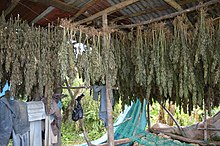Cannabis in Jamaica
| Part of a series on |
| Cannabis |
|---|
 |

Cannabis in Jamaica is illegal, but possession of small amounts was reduced to a petty offence in 2015. Cannabis is locally known as ganja, and internationally cannabis consumption plays a prominent role in the nation's public image, being tied to cultural touchstones such as Rastafari and reggae music.[1] Ganja tourists have been welcomed in the 21st century.
History
Cannabis was introduced to Jamaica in the 1850s–1860s by import from licensed businesses often run by Jewish families in the Bengal region of India (also now Bangladesh/West Bengal) for consumption by indentured servants from India during British rule of both nations; many of the terms used in cannabis culture in Jamaica are based on Indian terms, including the term ganja.[2][3][4]
Prohibition
Cannabis – then called "Indian Hemp" – was banned in Jamaica under the 1913 Ganja Law, supported by the white elites and the Council of Evangelical Churches in Jamaica.[5][6] The laws were gradually tightened over time, with academics noting that the harsh 1941 and 1961 restrictions occurred during periods where the authorities feared unrest in the lower classes.[7]
Commerce
While cannabis use had been customary in Jamaica for over a century, in the 1960s cannabis farmers began to take advantage of the growing demand in Europe and North America, leading to increased police enforcement, but also corruption of the security and political systems by the profits from international trafficking.[8]
Decriminalization
In February 2015, Jamaica's legislature voted to amend the nation's cannabis laws:[9]
- Possession of up to two ounces (57 g) is a petty offence, and will not result in a criminal record[10]
- Cultivation of five or fewer plants is permitted
- Practitioners of the Rastafari faith may use cannabis for religious purposes
- Tourists with a prescription for medical marijuana may apply for permits to purchase small amounts
- The amendments open the possibility of a licensing authority to deal with cultivation and distribution of medical marijuana
- Jamaica will continue to prosecute traffickers and target the international cannabis trade
Cannabis industry
In April 2015, Jamaica planted its first legal cannabis plant, at the University of the West Indies Mona campus.[11]
In March 2018, Balram Vaswani, a long-time advocate for the legalisation of marijuana, opened the first legal medical marijuana dispensary, Kaya Herbhouse, in Drax Hall, St. Ann.[12]
Heavy rains during the 2020 hurricane season, followed by a severe drought, an increase in consumption, and a decline in the number of retailers resulted in a marijuana shortage as of early 2021.[13]
As of 2021, the Jamaica Cannabis Licensing Authority authorized 29 cultivators and 73 transporters, processors, retailers and others. Marijuana was sold by legal retailers (called "herb houses") at about five to ten times the cost of cannabis sold illicitly on the street.[13]
See also
References
- ^ Veal, Michael (15 August 2013). Dub: Soundscapes and Shattered Songs in Jamaican Reggae. Wesleyan University Press. pp. 33–. ISBN 978-0-8195-7442-8.
- ^ Issitt, Micah; Main, Carlyn (16 September 2014). Hidden Religion: The Greatest Mysteries and Symbols of the World's Religious Beliefs. ABC-CLIO. pp. 123–. ISBN 978-1-61069-478-0.
- ^ Lee, Martin A. (14 August 2012). Smoke Signals: A Social History of Marijuana - Medical, Recreational and Scientific. Simon and Schuster. pp. 143–. ISBN 978-1-4391-0260-2.
- ^ Kalunta-Crumpton, Anita (25 January 2012). Race, Ethnicity, Crime and Criminal Justice in the Americas. Palgrave Macmillan. pp. 219–. ISBN 978-0-230-35805-8.
- ^ "The ganja law of 1913: 100 years of oppressive injustice - Columns". JamaicaObserver.com. 2 December 2013. Archived from the original on 25 July 2015. Retrieved 24 July 2015.
- ^ Drug Abuse in the Caribbean: Report of the Drug Seminar Held in Trinidad, November 26-28, 1986. Bustamante Institute of Public and International Affairs. 1987. p. 43.
they were used to justify criminalization of the drug in 1913 at the instigation of the Council of Evangelical...
- ^ Klein, Axel; Day, Marcus; Harriott, Anthony (13 November 2004). Caribbean Drugs: From Criminalization to Harm Reduction. Zed Books. pp. 20–. ISBN 978-1-84277-499-1.
- ^ Hamid, Ansley (1 January 2002). The Ganja Complex: Rastafari and Marijuana. Lexington Books. pp. 79–. ISBN 978-0-7391-0360-9.
- ^ "Jamaica decriminalises marijuana". The Guardian. Associated Press. 25 February 2015. Retrieved 24 July 2015.
- ^ "An Act to Amend the Criminal Records (Rehabilitation of Offenders) Act" (PDF). 2 October 2014. Retrieved 18 August 2020.
- ^ "Jamaica just planted its first legal marijuana plant - Curaçao Chronicle". Curacaochronicle.com. 21 April 2015. Retrieved 4 February 2017.
- ^ Vo, Kelly (23 April 2018). "Jamaica Opens Its First Cannabis Dispensary". Archived from the original on 9 November 2020. Retrieved 23 April 2018.
- ^ a b Hendricks, Sharlene; Coto, Danica (5 February 2021). "Jamaica faces marijuana shortage as farmers struggle". Associated Press.
Further reading
- Beaubrun, Michael H. (1971). The Pros and Cons of Cannabis Used in Jamaica (Working Paper for panel on Youth and Drugs, Costa Rica, January 8, 1971 ed.). U.W.I.
- Rubin, Vera (1 January 1975). Cannabis and Culture. Walter de Gruyter. pp. 119–. ISBN 978-3-11-081206-0.
- Murrell, Nathaniel Samuel (1 January 1998). Chanting Down Babylon: The Rastafari Reader. Temple University Press. pp. 131–. ISBN 1-56639-584-4.
- Roberts, Thomas B.; Hruby, Paula Jo (1976). Ganja in Jamaica: The Effects of Marijuana Use. Garden City, NY: Anchor. ISBN 0-385-12172-5. Archived from the original on 12 November 2016. Retrieved 10 December 2016.
- Meschino, Patricia (7 January 2015). "Legalize It: Marijuana's Relationship with Reggae and Its Future Prospects in Jamaica". Billboard. Retrieved 24 July 2015.
- "The Jamaica Situation". Gorilla Seed bank. 20 October 2015. Retrieved 21 October 2015.
